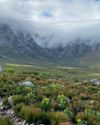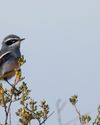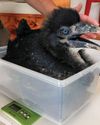
Italian conservationists have for the first time tracked a male European Roller Coracias garrulus from his nest site north of Rome to his wintering grounds near Namibia’s Etosha National Park – and then all the way back again.
The bird’s epic eight-month-long journey – covering about 16 000 kilometres – was recorded using a tiny solar-powered tracking device and his progress was electronically etched in small red and white dots on a GPS map. That image has been likened to ‘a pearl necklace on the Mother Continent,’ said Valeria Jennings, a researcher with Ornis Italica, the Rome-based conservation group behind the study.
Tracking devices, each weighing approximately 3.5 grams, were fitted onto the backs of four European Rollers. Only one of the devices was recovered, the one that went as far as Namibia on a bird the researchers dubbed the ‘Bracciano Roller’.
In May that roller was seen sitting on a fence post in Lazio, central Italy, close to his old nest site. He was one of the first rollers to arrive back after having left the study area in September 2018.
The research has revealed some fascinating details. For instance, the roller travelled at a height of about four kilometres and at a speed of 113 kilometres an hour across the Sahara. On his return trip via Tunisia, he crossed 800 kilometres of open sea in just more than a night, ignoring easier flyways such as the Sicily Channel.
European Rollers are rare in Italy (there are only about 2000 individuals in total). The researchers hope the data they gather on the birds’ habitat choices and movements both in Italy and Africa will help with conservation efforts.
This story is from the November 2019 edition of African Birdlife.
Start your 7-day Magzter GOLD free trial to access thousands of curated premium stories, and 9,000+ magazines and newspapers.
Already a subscriber ? Sign In
This story is from the November 2019 edition of African Birdlife.
Start your 7-day Magzter GOLD free trial to access thousands of curated premium stories, and 9,000+ magazines and newspapers.
Already a subscriber? Sign In

EXPLORING NEW HORIZONS
Keith Barnes, co-author of the new Field Guide to Birds of Greater Southern Africa, chats about the long-neglected birding regions just north of the Kunene and Zambezi, getting back to watching birds and the vulture that changed his life.

footloose IN FYNBOS
The Walker Bay Diversity Trail is a leisurely hike with a multitude of flowers, feathers and flavours along the way.

Living forwards
How photographing birds helps me face adversity

CAPE crusade
The Cape Bird Club/City of Cape Town Birding Big Year Challenge

water & WINGS
WATER IS LIFE. As wildlife photographer Greg du Toit knows better than most.

winter wanderer
as summer becomes a memory in the south, the skies are a little quieter as the migrants have returned to the warming north. But one bird endemic to the southern African region takes its own little winter journey.

when perfect isn't enough
Egg signatures and forgeries in the cuckoo-drongo arms race

Southern SIGHTINGS
The late summer period naturally started quietening down after the midsummer excitement, but there were still some classy rarities on offer for birders all over the subregion. As always, none of the records included here have been adjudicated by any of the subregion's Rarities Committees.

flood impact on wetland birds
One of the features of a warming planet is increasingly erratic rainfall; years of drought followed by devastating floods. Fortunately, many waterbirds are pre-adapted to cope with such extremes, especially in southern Africa where they have evolved to exploit episodic rainfall events in semi-arid and arid regions. But how do waterbirds respond to floods in areas where rainfall - and access to water - is more predictable? Peter Ryan explores the consequences of recent floods on the birds of the Western Cape's Olifants River valley.

a star is born
It’s every producer’s dream to plan a wildlife television series and pick the right characters before filming.